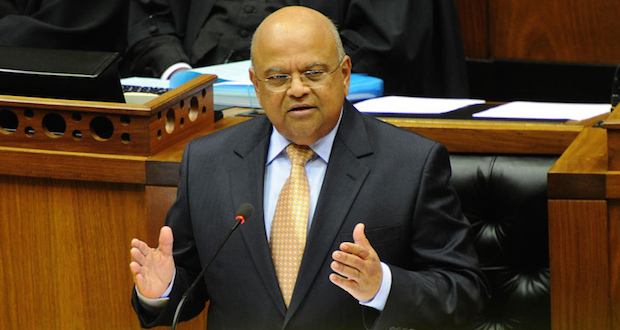The Daily Vox asked Ebrahim-Khalil Hassen, public policy analyst and founder of Zapreneur, what the most pressing matters will be in the Finance Minister’s mid-term national budget speech on Wednesday.
1. Alignment of the National Development Plan (NDP) and national budget
A few months ago, the cabinet decided that it would try to align the NDP and the budget process. One of the reasons it is believed that the budget is not redistributive enough towards the poor is because there’s no alignment between the government’s plans (the NDP) and spending (the budget). The mid-term budget speech will reveal what this alignment actually means in practice.
2. Free education and the higher education funding crisis
We should look out for whether a credible commitment around university fees and possible funding models are mentioned. Hassen speculates that there are two ways Gordhan’s speech could go.
The one possibility would be related to the commitment that the Minister of Higher Education, Blade Nzimande, has made to bridge the funding shortfall – the difference between what fees currently are and whatever funding increments the universities implement in order to meet their budgets. So there would need to be some sort of national budget commitment around that.
The other possibility is that Gordhan might just announce a general increase (in spending) for universities, so the amount that actually goes towards higher education increases. South Africa’s state budget for universities  makes up 0.75% of its Gross Domestic Product. The average for Africa is 0.78%, Senegal and Ghana sit at 1.4%, while Cuba’s is 4.5%. A commitment to increased spending on universities would effectively decrease the amount universities would need to collect from student fees – proportional to the amount of the budgetary increase.
Gordhan could potentially put an end to the crisis in higher education – so we’re keeping a very close eye on this one.
3. Employment and initiatives to increase jobs
Employment is big issue for Gordhan, and the country, for obvious reasons. He has a few initiatives he has set up to attempt to boost employment, like the Jobs Fund, the youth employment subsidy and two initiatives by the Presidential CEO Council – a fund to support small business and an internship programme.
But Hassen thinks it’s unlikely that these initiatives are enough to deal with the question of unemployment in our society.
“The minister’s obviously going to be addressing employment, it’s our key issue that we have, and the initiatives that he has undertaken are all very well intentioned, but without a more structural intervention within the economy, I don’t think we’re going to be able to see a massive decrease in unemployment over the next few years,†said Hassen.
4. State owned enterprises
Another important topic will be that of state owned enterprises (SOEs). Hassen expects a table which sets out the government’s exposure in terms of guarantees of loans for SOEs. Hassen suspects it will likely increase given the commitment that Gordhan has made for South African Airways (SAA) as well as the recent financial audits of the SABC. It’s a tricky issue given the politics and personalities involved in those issues. Public Enterprises Minister Lynne Brown and Gordhan have also spoken around possibly introducing an equity partner to SAA, so some sort of partial privatisation of these SOEs could be expected.
5. Clarity on SA’s energy policy
Markets and activists alike will be looking at a few issues relating to the country’s energy policy. One relates to the economic uncertainty around the Integrated Resource Plan (IRP) and the way forward in sustainably powering South Africa. There is currently controversy surrounding the direction of our energy policy and Gordhan’s speech might bring clarity to this matter. Eskom has been pushing for nuclear power – complaining of the costs of Independent Power Providers (IPPs) – while the Minister of Energy, Tina Joemat-Pettersson, has taken a more ambivalent position while stressing the importance of renewable energy. So greater certainty on the future of the IRP is much needed, especially with concerns surrounding the nuclear power deal being highlighted by activists and the the EFF.
6. Will the fiscal deficit increase or decrease?
A final big issue is the fiscal stance of government. Hassen anticipates a reduction in the deficit or at least a planned reduction in the deficit, and believes this the right move. “It’s more of a contextual support given the fact that we have a ratings downgrade imminent and there’s a worse prospect that might lay ahead. Usually one would argue for an increase in deficit spending, but this is not the case in our context for various reasonsâ€, said Hassen.









